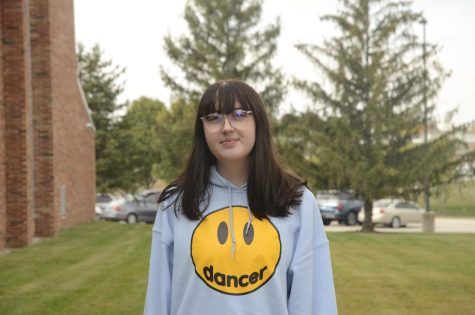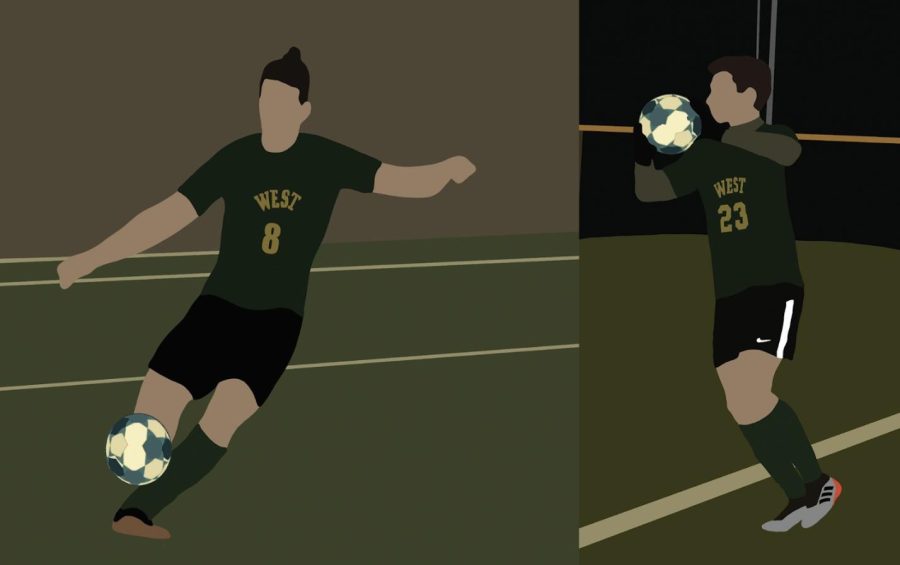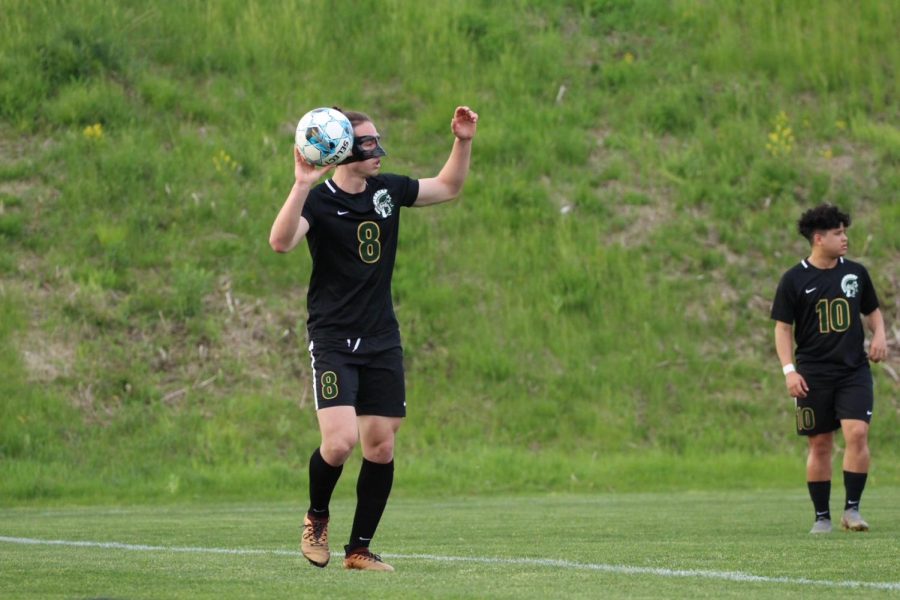Sharing the Field
Varsity soccer players Corentin and Erwann Charles share their passion for the sport and how their brotherhood has helped them improve as players and as individuals.
As they grew up, Corentin and Erwann Charles have continued to engrain themselves into soccer while using the sport as a catalyst for their relationship.
Sitting with their grandparents and a close-knit group of French community members, two young boys stare at the iridescent television screen, mesmerized by the little dots racing across the field. As they watch the 2018 World Cup in France, they dream of becoming professional soccer players. Corentin Charles ’23 and Erwann Charles ’25 are currently members of West’s varsity soccer team. Although they no longer envision themselves as professional soccer players, they strive to achieve their initial goals in a different way.

Originally from France, Corentin and Erwann frequently moved between the United States and their home country, eventually settling in Iowa in 2016. Their older brother, Malo Charles ’21, helped embed soccer into the Charles family. As the two grew up watching Malo play in games and practices, they also fell in love with the sport.
“You just fall into your older brother’s footsteps. It wasn’t really a choice. It was more like ‘Just do it,’” Corentin said.
Due to the deep integration of soccer into the country’s traditions, Erwann believes that the sport is a part of everyday life in France. However, he notes a difference in the culture of U.S. soccer compared to his home country.
“[In the U.S.], you’re not going to encounter soccer unless you’re at practices or at games. It’s more enclosed and it’s a smaller community,” Erwann said. “In France, it’s everywhere.”
Corentin adds that children in France view professional soccer players as role models and even copy their actions, such as spitting on the playing field.
“They’re your idols. When you’re a kid [in France], you adore them. It’s almost like a religion,” Corentin said.
Although there are differences in soccer culture in the U.S. compared to France, Erwann believes that the same familial relationship with teammates is engrained at West High.
“[My relationship with my teammates] is comparable to a brother or cousin. It’s my first year on the varsity team, so it’s mostly new people who are my teammates, but I feel pretty close to them already because we go to practice every day of the week. We are in that same struggle [of soccer] and that just brings us together,” Erwann said. “They’re my team and none of us would ever give up on each other. It’s a really, really close bond.”
Corentin has noticed a similar connection with his teammates, believing they have encouraged him to become a better person and overall player.
“When you’re on the field and you’re playing and you’re practicing and you’re pushing each other, it’s a bond that’s completely different because you’re in the same struggle and you know you’re working hard for each other and you know you’re leaving it all out on the field,” Corentin said. “When you see your teammates do that, you want to do the same.”
In addition to forming close-knit relationships, the Charles brothers enjoy partaking in friendly competition with each other and assuming different roles on the team. As the varsity captain, Corentin takes on detail-oriented responsibilities.
“I make sure everyone’s on the same page and everyone’s ready to play,” Corentin said. “Since I’ve been here as one of the longest players, it’s my role to teach the values and important ideals that West soccer is all about to the next generation.”
Erwann views his job on the team as a motivator, uplifting those around him when playing.
“My role on the team is to make sure everyone else is working hard because I’m not one of the best players, so I always need to be working hard,” Erwann said. “That way, the players that are better than me, they know they can’t be slacking. They can’t have an off day and skip practice or not try.”
Corentin believes that playing the same sport as his younger brother has allowed the exchange of meaningful advice, helping each other improve in soccer.
“I’ve always tried to push Erwann to be the best player he can be but also to be a good teammate. And he’s always the little brother that’s nagging, so he’s made me want to improve myself,” Corentin said. “We’re always trying to one-up each other and I think that makes us both better. In the end, it’s not like we’re trying to push each other down. We’re trying to help each other up.”
Although healthy competition has encouraged him to continue growing, Erwann notes the rare times he feels expectational pressure due to his older brother’s skills in the sport.
“I feel like there’s some pressure on me to play well because Corentin is one of the team captains of varsity, and he’s one of the strongest players on our team,” Erwann said. “Whether it’s there or not, I feel pressure to play really well.”
In contrast, Corentin has rarely experienced expectational pressure and views his two brothers as motivation.
“We’re just all in the same race trying to better each other,” Corentin said. “It’s fun going to practice together. Sharing the field together is something that you don’t really get to experience a lot.”
Corentin acknowledges other challenges in soccer and believes that success can only occur with hardships.
“[Soccer] presents a lot of challenges, whether it’s mentally or physically, and you have to be able to continually push past your limits because that’s how you get better in the end,” Corentin said.
Erwann adds that the lessons he learned from soccer have allowed him to improve in other aspects of his life, such as academics.
“[Soccer] teaches a lesson of hard work and that hard work does pay off,” Erwann said. “If I want to get better grades, then I just have to study more and pay more attention in class. That’s something that I translate from soccer.”
Though soccer comes with its challenges, Corentin believes that the foundation of playing is finding happiness in the sport.
“You have to go with the flow, having fun and enjoying what soccer is all about and just playing with your heart because at the end of the day, that’s why you play,” Corentin said. “It’s to remind yourself of those moments of playing on the street with your friends.”
In addition, Erwann believes that winning gives him a sense of fulfillment and makes those around him proud.
“I want to get my team to win more than I ever have before because there’s more people counting on me and we’re all counting on each other to push each other to win,” Erwann said. “That’s why I prioritize getting my team to win [through having fun] and not letting my teammates down.”
Corentin thinks that pivoting from his initial plans of becoming a professional soccer player to focusing on academics has resulted in his further appreciation of the sport.
“I’m focusing on academics, but I’ll definitely keep on playing until I physically can’t,” Corentin said. “Now, I’m enjoying it and playing it for the love of the game. I feel like a little kid when I’m on the field now. That feeling of pure joy is incomparable.”
Although becoming a professional athlete was the original endgame, Erwann’s goals in soccer have changed to indulging in the sport with his brothers.
“I don’t see soccer as a career option anymore,” Erwann said. “The main goal now is to have fun because that’s why you play. If you’re not having fun while playing then why are you really playing?”
Your donation will support the student journalists of West High School. Your contribution will allow us to purchase Scholarship Yearbooks, newsroom equipment and cover our annual website hosting costs.

(She/her) Reem Kirja is the West Side Story print Profiles Editor and this is her second year on staff. She enjoys exploring different world issues and...

(she/her) McKenna is a senior and this will be her second year on staff. She is a designer and photographer for WSS. McKenna is also involved in show choir,...

(she/her) This is Elena's second year on staff. This year she is news editor and social media co-editor. When she's not at school she is either working,...




